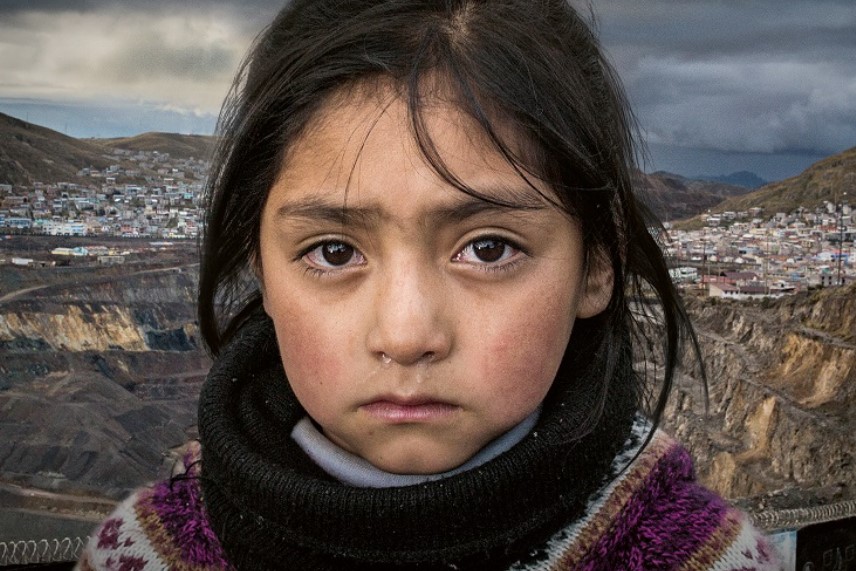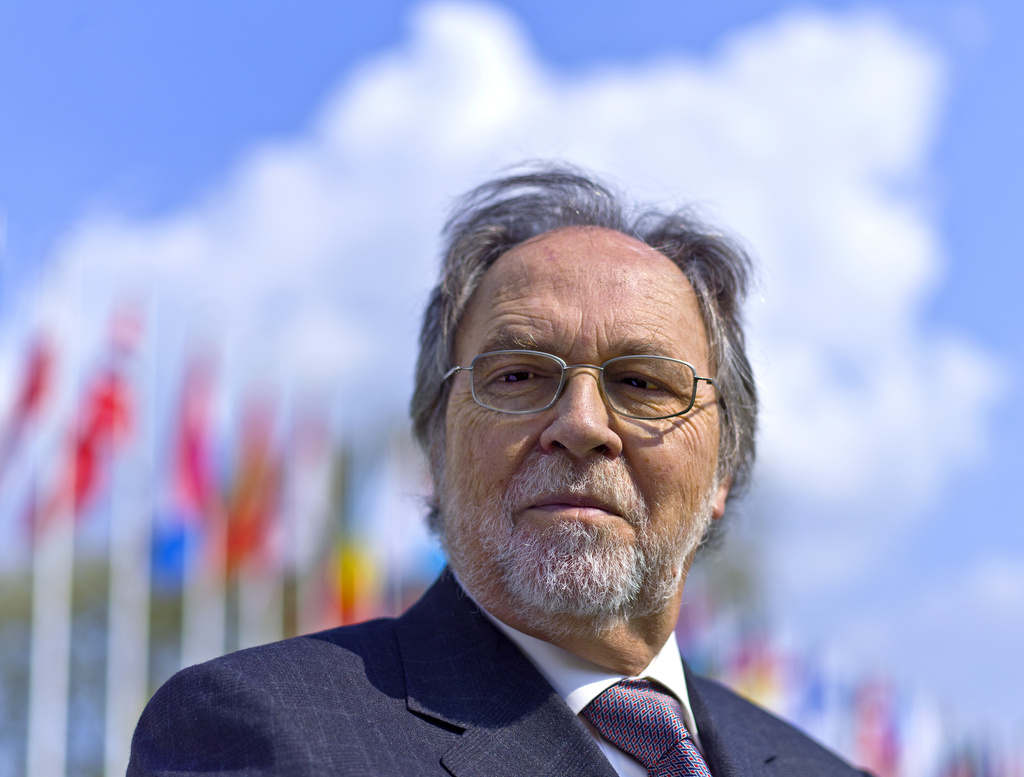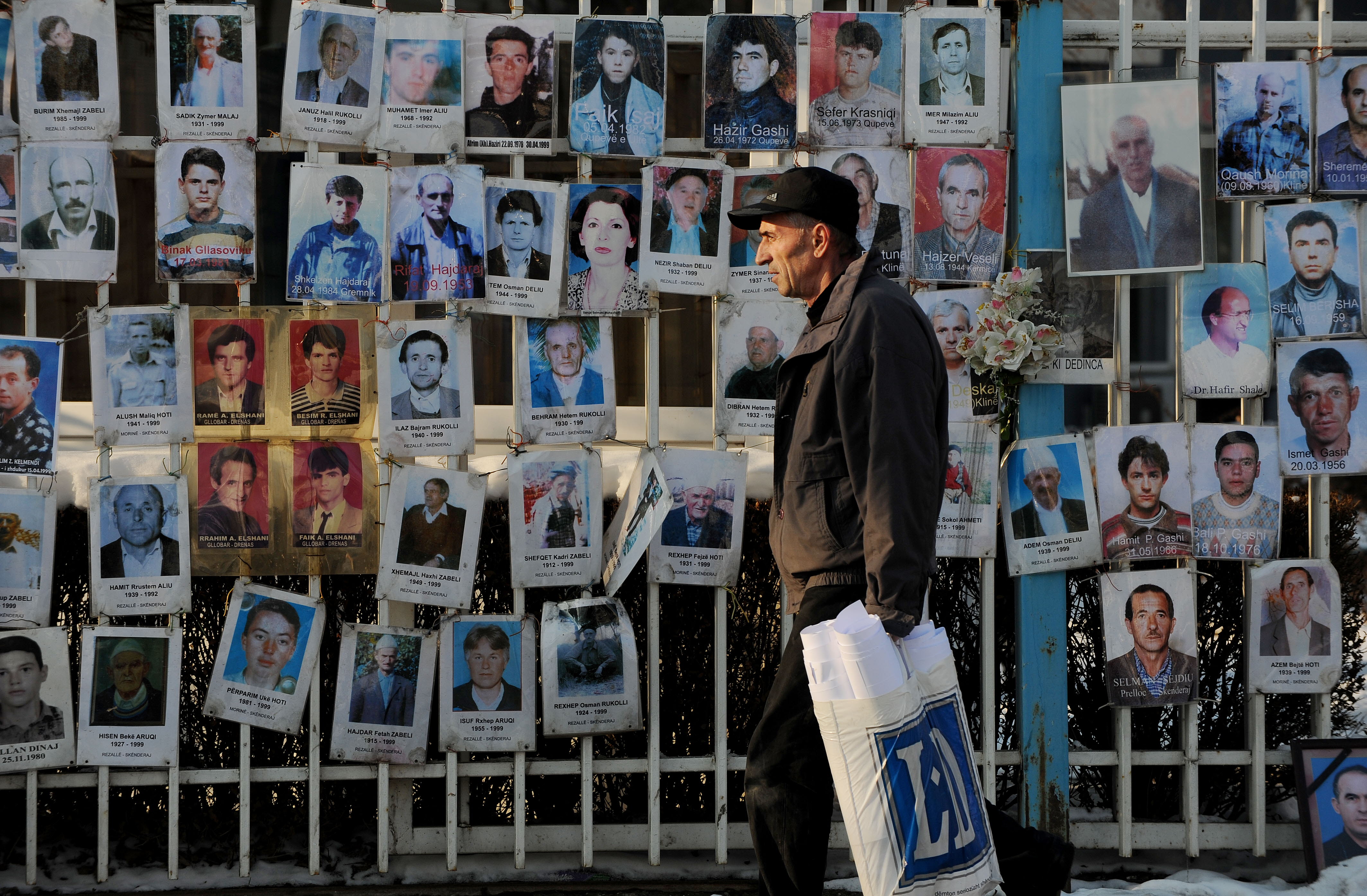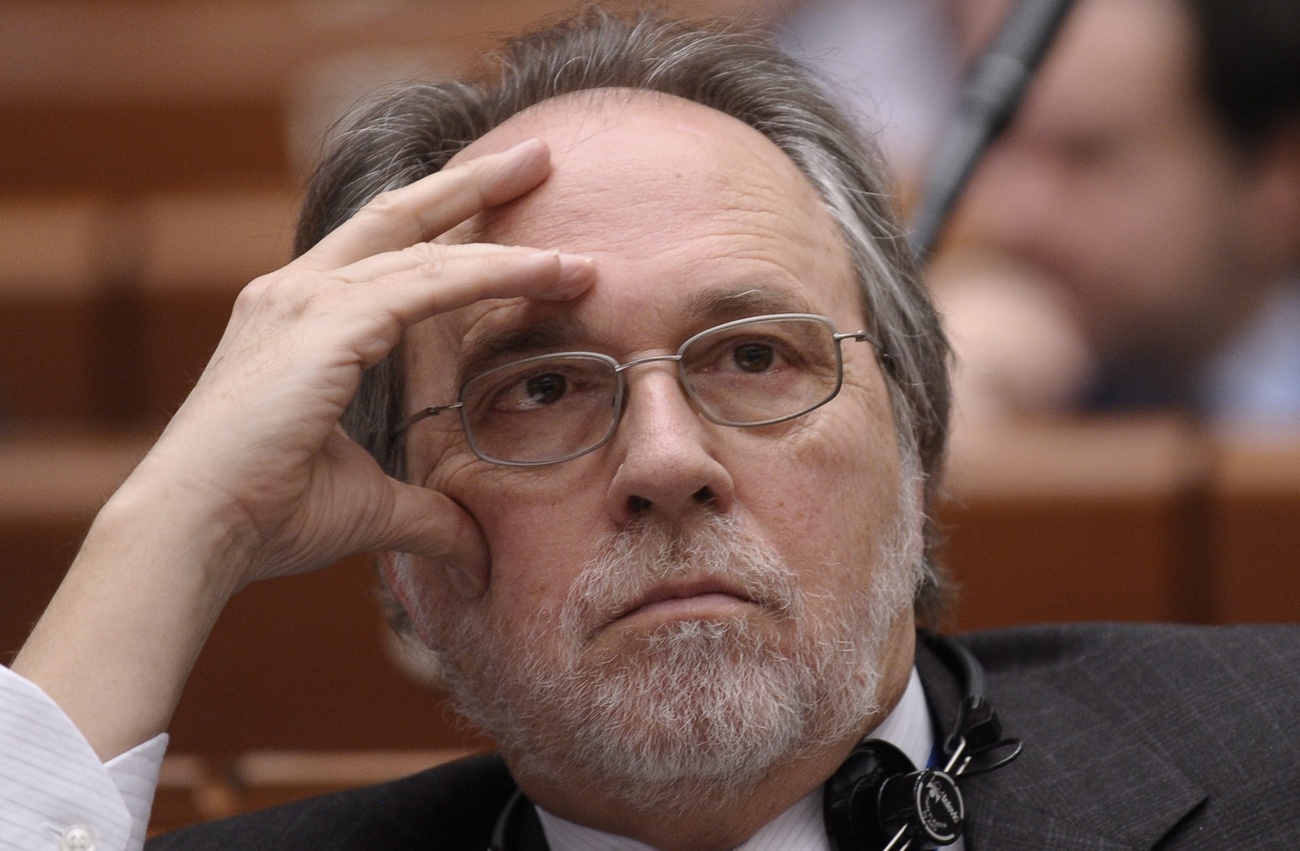Dick Marty: a magistrate loaned to politics

Dick Marty, who died on December 28, 2023, aged 78, was one of Switzerland's most famous politicians. He was best known internationally for his investigative work for the Council of Europe.
It is a difficult task to review all the positions and offices held by Dick Marty and all the investigations he conducted. Marty died on December 28, aged 78, following an illness that was revealed in his final interviews and in the book Verità irriverenti. Riflessioni di un magistrato sotto scorta (Irreverent Truths: Reflections of a Magistrate under Protection) published by Edizioni Casagrande.
A magistrate and politician – indeed, “a magistrate on loan to politics” as the former public prosecutor of canton Ticino Piergiorgio Mordasini referred to him – Marty was certainly one of the most prominent Ticino personalities in recent decades. A common thread runs through his life: he was a staunch defender of human rights and he spent his life in pursuit of truth and justice. The latter was an indispensable condition of democracy, as he recalled in an interview a few months ago. “When it comes to human rights, to justice, you can have all the agendas you want but the priority is always justice. This is my choice and on this I do not want to yield,” he said.

More
Rights expert calls to strengthen corporate responsibility
Dick Marty was born in Sorengo, a municipality of Lugano in canton Ticino, on January 7, 1945. His father’s family originated from canton Valais. After completing school in Lugano, he studied law in Neuchâtel and qualified in 1969. He obtained his doctorate in Freiburg im Breisgau in 1974 with an award-winning thesis on the role of the judge in the application of criminal sanctions. After a few years at the Max Planck Institute, he left the academic world for a career in law, first working in the judiciary in his home canton of Ticino. There he was a deputy public prosecutor and then public prosecutor from 1978 to 1989.
The 100 kilos of heroin, the ‘Lebanon Connection’ and Elisabeth Kopp
Those were the years of major investigations against organised crime and drug trafficking, culminating in the most important seizure of heroin and morphine base in Swiss history. A truck carrying 100 kilos of narcotics was intercepted in Bellinzona, in canton Ticino, where the trafficker, Haci Mirza, was arrested.
The investigations earned Marty, together with Commissioner Fausto Cattaneo, the ‘Award of Honour’ from the US Department of Justice and the International Narcotic Enforcement Officers Association in 1987.
In July 1988, Marty had the brothers Jean and Barkev Magharian arrested on suspicion of laundering drug money. On the fringes of the ‘Lebanon Connection’ investigation, the name Shakarchi Trading appeared. Hans Kopp, a Swiss lawyer and media expert who was married to federal minister Elizabeth Kopp, sat on the board of this company.

More
Dick Marty puts values over interests
A few months later, Elisabeth Kopp resigned from her position. But this accusation cost Kopp her political career. She admitted that she had warned him and was forced to resign from the Federal Council on January 12, 1989.
A result of his work as a public prosecutor, Marty was proclaimed ‘Swiss Man of the Year’ by the viewers of French-speaking Swiss television TSR in 1989.
The CIA’s secret prisons, Chechnya and Kosovo
Marty’s investigations are recounted in the book ‘Una certa idea di giustizia’ (‘A Certain Idea of Justice’), published in 2020, with a foreword by former Turin prosecutor Armando Spataro. The book discusses investigations conducted during his time as a public prosecutor, but also those conducted after he became a member of the Parliamentary Assembly of the Council of Europe in 1998.

More
Council adopts Dick Marty’s Kosovo report
The Council of Europe awarded Marty the Pro Merito prize on December 1, 2023, just 27 days before his death for his two reports presented in 2006 and 2007 on a ‘global spider’s web’ of CIA detentions and secret transfers as part of the fight against terrorism. The report included the probable collusion of 14 Council of Europe member states. It did not spare Switzerland, which allegedly tolerated the use of its airspace for prisoner transfer flights.

Marty’s conclusions were then twice confirmed by the assembly responsible for approving reports. European countries had turned a blind eye to the extraordinary renditions and secret prisons that had been set up in Poland and Romania. An investigation encountered roadblocks, criticism and resistance, including from Marty’s home country, Switzerland. “Alle gegen Marty‘ (‘All against Marty’), headlined one Swiss newspaper report.
“When you know that you are on the way to the truth and you have proof, indeed it gives you strength. You just have to have the strength at that moment to keep quiet and not react, because when the time comes, they will have to keep quiet,” he declared in an interview in March, which was also one of his last television appearances on Swiss public television, RSI. In December 2022, he said something similar: “I think it is important never to give up, because by moving one pebble after another, someone will eventually realise that we have moved mountains”.
In 2010, as rapporteur for the Council of Europe, Marty travelled to the the North Caucasus republics of Chechnya, Dagestan and Ingushetia to document the human rights violations committed after the Russian military intervention against Chechen separatists, which had begun nine years earlier. “The mission that on a human level left the biggest impression on me,” he wrote.
In a 2012 report commissioned in Strasbourg, he condemned the trafficking of organs of Serbian prisoners conducted in the late 1990s by the Kosovo Liberation Army (KLA). The allegations were first made by Carla Del Ponte, the former chief prosecutor of the International Criminal Tribunal for the former Yugoslavia, and were published in her book.
Under protection
This case followed him and caught up with him in his final years. In April 2022, Swiss public television RTS reported that since December 18, 2020, Marty had been living under strict (grade four out of five) police protection. He had even been offered the option to change his name and address. “But I didn’t consider that as an option,” he later recounted. He regretted how much these threats had also affected his family, whom he had always managed to “keep out of everything” up to that point.
The year-and-a-half-long security measure followed intelligence information that his life was under threat from factions of the Serbian secret service who intended to pin the blame on the Kosovars.

More
Former Swiss prosecutor ‘targeted by Serbian assassins’
“I believe this affair could have been resolved more quickly, if there had been the political will in Bern,” he told Swiss public television RSI in April, explicitly accusing the federal government of ‘not wanting trouble’. His experience was recounted in the book, ‘Sous haute protection’ (Under High-Level Protection), and also in his latest publication ‘Irreverent Truths‘ in which he denounced the ‘denied investigation’ against his persecutors.
The authorisation from the Swiss justice ministry (then headed by Karin Keller-Sutter) took eight months. Additional steps were taken with significant delay, and many requests from Marty himself were left unanswered.
Cycling and doping
Among the many investigations conducted by Marty, one which is particularly noteworthy is the 2014 investigation into the International Cycling Union. The aim was to shed light on the systems and processes of former cycling managers Hein Verbruggen and Pat McQuaid, as well as to focus on the fight against doping. From the investigation, it emerged that the cyclist Lance Armstrong had benefited from favourable treatment.
From the judiciary to politics
Between these investigations, Marty entered both cantonal and federal politics, beginning in 1989. He was first called to replace the outgoing state councillor Claudio Generali. In 2015, he explained his reasons for accepting this offer: “I was ambitious for my home canton. I wanted a canton that was less whiny, more self-confident and confident in its own means.”
As a member of the centre-right Radical-Liberal Party, he headed the canton’s Department of Finance and Public Construction, which became the Ministry of Finance and Economy in 1992, the year in which he was president of the Ticino cantonal government.
On the federal stage
He remained in the cantonal government in Bellinzona for six years. Then it was time to aim higher. In 1995, he was elected to the Senate in Bern, where he was re-elected three times. He took part in numerous parliamentary missions abroad, including Rwanda, Cuba, Iran, Guatemala and Taiwan.
He was also a member of the parliamentary committees on finance, foreign policy, political institutions and legal affairs, which he chaired from 1999 to 2001. As a member of parliament, he helped to make the laws he was called upon to implement.
Among the political battles that he led and won is the one to expand the remit of the Office of the Attorney General of Switzerland to cases of organised and international crime. He also argued for the independence of the Federal Prosecution Service itself, whose director up until this point had been chosen by the government, which also exercised supervisory powers over the office.
In his book ‘Una certa idea di giustizia’ (‘A Certain Idea of Justice’), he described the outcome of this reform as “disappointing in no small measure”. “But I am still convinced that the path taken is the right one to tackle the challenges posed by modern crime,” he declared.
Some of the other offices held by Marty include the presidency of Switzerland Tourism, a position he held from 1996 to 2007 at the insistence of the then Federal Councillor Jean-Pascal Delamuraz, and that of the Swiss Scout Movement, to name but a few.

In 1999, in his role as a parliamentarian, he proposed that an ‘extra muros’ session of the Federal Assembly be held in Lugano. This proposal was accepted and from March 5 to 23, 2001, parliament met in Ticino for only the second time outside the walls of Bern’s Federal Palace. The only other time the Federal Assembly was held outside Bern was in Geneva in 1993.
Looking at his long CV, perhaps the only line missing is Marty’s election to the Federal Council. When it came to nominating Pascal Couchepin’s successor in 2009, the Radical-Liberal Party hedged their bets on Didier Burkhalter and Christian Lüscher. The former was then elected. Marty, who was not an official candidate, nevertheless obtained 34 votes in the first round before dropping out in the third.
At the end of his fourth legislature in parliament, Marty did not stand for re-election in 2011. On October 14, 2011, the University of Geneva awarded him an honorary doctorate “for his commitment without concessions”. This was, however, not his last political commitment. In 2020, he campaigned in favour of the initiative for responsible multinationals, which was backed by 50.7% of Swiss voters but not the majority of cantons.
He would have liked to have left the public scene then and devote himself to idleness “fatal only to the mediocre”, as he wrote in one of his books, quoting French writer Albert Camus. But the threats to his life and then illness followed. His book Irreverent Truths reflects ‘irreverent truths’ about Switzerland’s role on the global stage, which he saw as being linked to humanitarian policy, the future of federalism and neutrality, and the changing geopolitical balance in the world, with the decline of the West and the deterioration of democracy, from which even Switzerland is not immune.

More
Ex-Swiss prosecutor Dick Marty on politics, truth and his ‘last battle’

In compliance with the JTI standards
More: SWI swissinfo.ch certified by the Journalism Trust Initiative








You can find an overview of ongoing debates with our journalists here . Please join us!
If you want to start a conversation about a topic raised in this article or want to report factual errors, email us at english@swissinfo.ch.